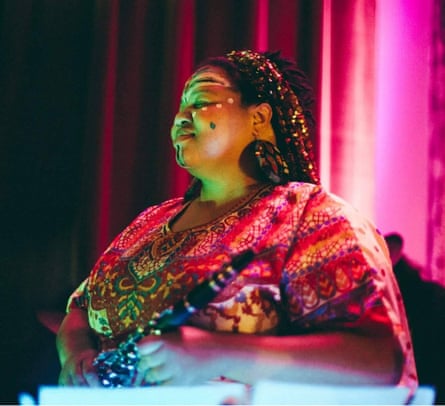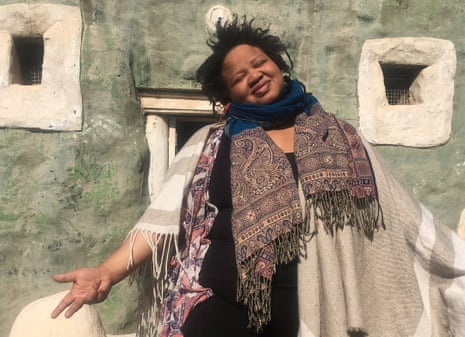For young black girls from deprived parts of Chicago looking to play the clarinet, there aren’t too many role models. “I’d never even heard of the clarinet before. It didn’t look cool. I’d seen saxophones, but this looked weird,” says Angel Bat Dawid, who was told she could play one in her school band. “I went to the library to work out what it sounded like, and everything I could find was Benny Goodman. I was like: damn, this corny-looking instrument with this corny-looking white dude.”
Thirty years later, Bat Dawid has hauled the clarinet out of corny white dude territory and hurled it into the cosmos. She appears at this month’s London jazz festival and her debut album The Oracle is one of the year’s best releases in any genre, where swelling vocals, warm organ chords and lilting and freaked-out clarinet lines combine in a profoundly affecting whole. It was recorded on the voice notes app of her iPhone, and takes its name from her own nickname, a character in the Matrix: “A powerful black woman, and when everyone is acting crazy, she’s chilling in her kitchen and dropping so much wisdom. I aspire to be a woman such as that.”
Bat Dawid is often a hoot down the phone from Chicago’s South Side, her voice cracking into hilarious high-pitched incredulity, but she jolts me out of the mirth with calm, sad ruminations on life in the US. “I’m a black woman – there’s no turning that off,” she says. “I look at the totality of the black experience. I don’t see my sister who has a crack addiction for 40 years as not being successful. Because of the lineage she’s coming from, this is the best she can do. When you’re black, being alive is a success.”
It was Mozart who first ignited her love for music, on a family cinema trip to see Amadeus, and later for the clarinet, when the composer’s 1791 Clarinet Concerto blew Benny Goodman out of the water. “The reason why me and my siblings wanted to play instruments is that we wanted to be cooooold!” she laughs. “We wanted to play runs, and be like Fiddler on the Roof. I didn’t know that with a clarinet, you can rip on it, and so then I really fell in love with the sound.”
As the daughter of Christian missionaries, she had spent four years of her late childhood in Kenya and found it hard to adjust to life back in the US as a teenager. “People didn’t understand me, kids bullied me. Music and the arts kept me sane through all those weird adolescent years.” She eventually went to college to study classical music. “When you go into the classical realm, there’s less and less diversity, fewer and fewer black people. I experienced a lot of micro-aggression.” A professor expressed surprise at her skill in a conducting class. “Why? Is it because I’m black? ‘Yeah!’ He blatantly said it! People meet me and I say I’m a musician, and it’s: ‘Oh, do you sing?’ Because that’s all a black woman can do. There’s no way she can be a multi-instrumentalist and composer. I’m this rebellious spirit, so it drove me deeper into getting better at my craft.”
But the micro-aggressions stacked up into disenchantment, compounded by a brain tumour in her third year. “I had all these medical bills. It was a lot. So I just started working.” She recovered and ended up with a well-paid job in a high-end lingerie boutique, where she worked for seven years. While she enjoyed helping women with different body types, the consumerist environment chafed. “Looking at boobs all day was not my passion.” She “retired”, cashing out her pension and putting it towards a year’s rent to allow her to focus on music. “My whole premise was saying yes to the things I would normally say no to, because I had to work. As soon as I started saying yes, wild shit started opening up.”

She’d been making experimental rap beats on the side, and started jamming with a jazz collective, Participatory Music Coalition. “I was nervous about jazz in general. The way that men do jazz, no shade, it turns into a sport. It was kind of intimidating.” Saxophonist David Boykin, who hosted a Sunday jam session called Sonic Healing Ministries, calmed her nerves. “He said: ‘play anything!’ I said: ‘We can just do that?’ Free jazz freed me – my ears, my ability.”
She discovered the rich history of improvised music in the city: units such as the Art Ensemble of Chicago and the Association for the Advancement of Creative Musicians (AACM). “I was like: what?” Her voice bunny-hops up an octave. “There’s this black experimental collective who live on the South Side, right down the block from me?” She met with AACM members, including co-founder Muhal Richard Abrams. “He looked at me straight in the eye and said, ‘if you take care of the music, it will take care of you’. I’m like, whuuuut? I bow to the sensei right now!” She took on shifts at a record shop to boost her income, but has managed to quit that, too. “Being a musician full-time, people are like, how are you getting paid? I don’t know. I really don’t. When I had my full-time job, I was always broke. Now I’m freelancing, taking gigs, and for whatever reason it just keeps working out. It goes back to what Muhal was saying: take care of the music and it will take care of you.”
Her music has since taken her all over the world, with portions of The Oracle recorded in London and South Africa. It wasn’t intended to be an album at all – the phone recordings were guidance notes Bat Dawid made for an ensemble where some of the players couldn’t read music, later arranged into full tracks at the behest of local experimental label International Anthem. She used online videos to learn production and mastering techniques. “YouTube – that’s my university,” she says. “I’d been in the studio before, and there was always some white guy who knows nothing about black people and black music who wants to tell me how it’s supposed to sound because he went to university and he’s looking at numbers on a screen. Uh uh.”
One of The Oracle’s most powerful moments is a choral take on a 1963 poem by Margaret Burroughs, What Shall I Tell My Children Who Are Black, about “what it means to be a captive in this dark skin”. By performing it in 2019, Bat Dawid announces that black people are still captive. “I hate that poem,” Bat Dawid says bitterly. “I hate the song, too. I know Margaret Burroughs hated writing it. It’s ridiculous that over 50 years later we still singing it.”
Bat Dawid says her melancholic music is a way to vent the pain that racism rends. “Tears are a survival mechanism for us to release our emotional pain, and blues and spirituals were the technologies that we used to activate that sympathetic system, so that we can survive trauma,” she says, acknowledging a theory from jazz drummer Milford Graves. “We are in a traumatic state of being, as black people. We aren’t free – this is just a 2019 version of the 1619 situation. Back then you would have to put chains on people’s hands to keep them in bondage, but if you do this oppressive shit for over 400 years, you don’t need chains any more.” She sees ongoing oppression take form in the disproportionate incarceration of black men, in police brutality, in the version of black beauty that western culture permits. “I’m a genetic representation of our ancient African mothers. They look like me – but it’s not whatever magazines say is beautiful.”
Even cash is oppressive. “In order for any of us in this country to buy something, we have to look at people who owned slaves. George Washington, Abraham Lincoln – all these people were evil men. They did not think I was human. These things, they never stop, but in a white world, they want to think things have changed.” After hostile, “outright but subtle” looks her band faced in an Amsterdam airport, “some of my white friends were like, ‘We’re so shocked, we thought Amsterdam was …’ – the fact that you’re shocked is racist. Because you really think this stuff ended. I’m not a politician, but I got a horn, and I know how to read and write music, and I’m going to do that until this thing is done. I can’t live in this world any more, this is ridiculous. I get mad every day. We do not have live in a world like this.” She sounds so tired as she separates every word: “We do not have to do it.”
But she finds joy in her work, in “feeling heard, to be able to express all the pain and suffering you go through as a black person”, and even if she’s not a politician, she is lifting up black lives. A recent new work, Requiem for Jazz, was performed by an all-black ensemble, including a 12-year-old clarinet student Bat Dawid is teaching. “They cut all the arts programmes, she ain’t got no band. If she lived on the [prosperous and predominantly white] North Side, she could be in bands; in the South Side, they got guns but they ain’t got no instruments. But now she got a black woman who composed a whole piece of music, and she can see all these black people playing it.” No more corny white dudes for role models, then.
